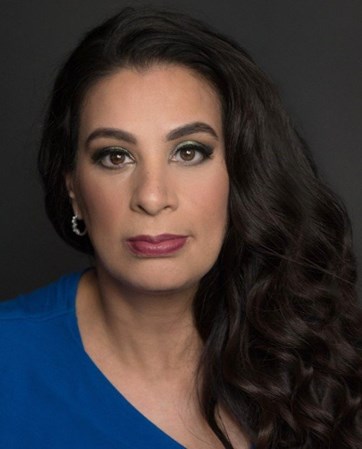Actress, comedian and writer Maysoon Zayid discussed disability and entertainment in this week’s Honors Colloquium. Photo from uri.edu.
“In the oppression Olympics, I would win a gold medal,” Maysoon Zayid said at this week’s Honors Colloquium lecture. “I’m Palestinian, I’m Muslim, I’m a woman of color, I’m disabled and I live in New Jersey. If you don’t feel better about yourself, maybe you should.”
This week’s Honors Colloquium lecture, “Disability and Entertainment,” was a hilarious and candid discussion about the struggles faced by people with disabilities in the entertainment industry led by Zayid.
Zayid is an actress, writer, comedienne and disability advocate. Her professional credits include on-air appearances on programs such as “Countdown with Keith Olbermann,” “60 Minutes,” “ABC News” and a recurring character role on “General Hospital.” She is the co-founder and co-executive producer of the New York Arab Comedy Festival and Muslim Funny Fest. Her TED Talk, “I got 99 problems… palsy is just one,” was the most viewed TED Talk of 2015.
Born with cerebral palsy, Zayid’s disability has affected her ability to walk from a young age. She did not have access to mobility devices like walkers or crutches, as she was born before the Americans with Disabilities Act was passed. Zayid’s father was determined to teach her how to walk by placing her feet on his feet as he walked. Her father’s desire for normalcy continued into her education, as he wanted her to attend public schools instead of the recommended school for children with Down syndrome. \
Studying theatre at Arizona State University, Zayid said she came in contact with her first experience of discrimination in entertainment. While she did well in all of her classes and befriended much of the faculty, she was never cast in any shows. This reached a breaking point when she was denied the lead role in a play about a girl with cerebral palsy, which was given to an able-bodied classmate.
Zayid said that these discriminatory casting practices imitated the sordid history of mistreatment in Hollywood when casting disabled characters. While people with disabilities make up 20 percent of the population, only 2 percent of television characters have visible disabilities. 95 percent of those characters are played by non-disabled actors.
“Media shapes our narrative,” Zayid said, “and I believe that if we had more positive images of disability on TV, we could actually save lives.”
Her first big job after college was as an on-air contributor on “Countdown with Keith Olbermann.” After experiencing hurtful comments about her disability and ethnicity online, she realized that she did not want strangers online to define her, and that she should always cheer for herself even when no one else is.
The biggest takeaway Zayid wanted listeners to have was to dream big. Growing up, Zayid dreamed of tap dancing on Broadway and landing a role on “General Hospital.” While she noted that many discredited her dreams because of her disability, she still pursued those dreams for 20 years. Not only did she land her dream role on “General Hospital,” but she had the opportunity to tap dance on stage after booking a standup comedy show on Broadway.
“I never needed to find another dream, you needed to accept my reality,” Zayid said. “The world is broken, but we can fix it. We can fix it by continuing to dream big.”

